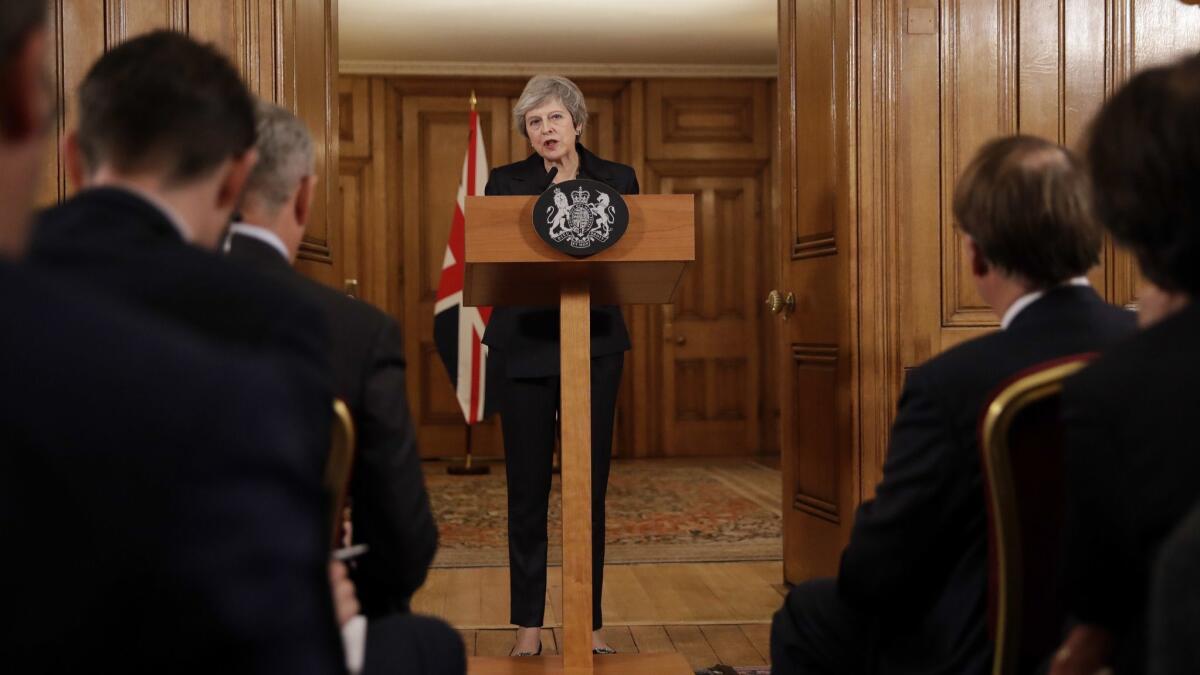Editorial: ‘Brexit’ was a bad idea. Here’s how to limit the damage

British Prime Minister Theresa May on Thursday defended the “Brexit” agreement she reached with the European Union as “a decisive breakthrough.” A more honest description would be “making the best of a bad job,” the bad job being the disastrous decision by 52% of voters in 2016 to withdraw the United Kingdom from the EU.
No one is particularly happy with the deal May’s government has cut, but if Brexit is going to go through, the agreement deserves to be approved by the British Parliament. That would allow the U.K. to leave the EU without an abrupt rupture in its trade with Europe and without jeopardy to the hard-won peace process in Northern Ireland. May shouldn’t be deterred by defections from her Cabinet or the possibility of a challenge to her leadership from dissidents in the Conservative Party.
Like many Europeans and, indeed, many U.K. residents, we’d like to see the whole Brexit deal undone in a national referendum or otherwise. But that seems increasingly unlikely.
The 585-page agreement reached by British and EU negotiators doesn’t permanently define future trade relations between the two parties. But it does provide for a gradual transition and contains complicated procedures to ensure that goods and people can travel freely between the Northern Ireland, which is part of the U.K., and the independent Republic of Ireland, which will remain part of the EU.
Enter the Fray: First takes on the news of the minute from L.A. Times Opinion »
The fact that both the U.K. and the Republic of Ireland were members of the EU contributed significantly to the Protestant-Catholic peace process in Northern Ireland. That’s why preventing the return of a “hard border” between Ireland and Northern Ireland is essential.
To that end, the agreement contains provisions that, under some circumstances, could allow EU rules to be imposed on Northern Ireland that don’t apply to the rest of the U.K. Different treatment for Northern Ireland is anathema to some of May’s critics, including members of the Democratic Unionist Party of Northern Ireland, which has formed a governing arrangement with May’s Conservatives. One DUP member of Parliament warned that the deal would lead to “the breakup of the United Kingdom.”
But successive governments in London have recognized that Northern Ireland is a special case and that connections between the northern and southern parts of that island are important. For example, in 1993, Prime Minister John Major declared that the British government had “no selfish strategic or economic interest in Northern Ireland” and would accept the decision of the majority of the people of Northern Ireland about whether they wanted to remain part of the U.K. The British government reaffirmed that position in the 1998 Good Friday agreement.
Brexit is a bad idea beyond its consequences for Ireland. It will hamper British businesses and deny the U.K. a voice in the political deliberations of the EU; it is a giant step backward for the post-World War II project of European integration. Sadly, there seems to be little chance that the voters will be offered an opportunity to reconsider their decision. That means the goal should be a separation that causes the least disruption and disorder. That is what May is proposing.
Follow the Opinion section on Twitter @latimesopinionand Facebook
More to Read
A cure for the common opinion
Get thought-provoking perspectives with our weekly newsletter.
You may occasionally receive promotional content from the Los Angeles Times.






